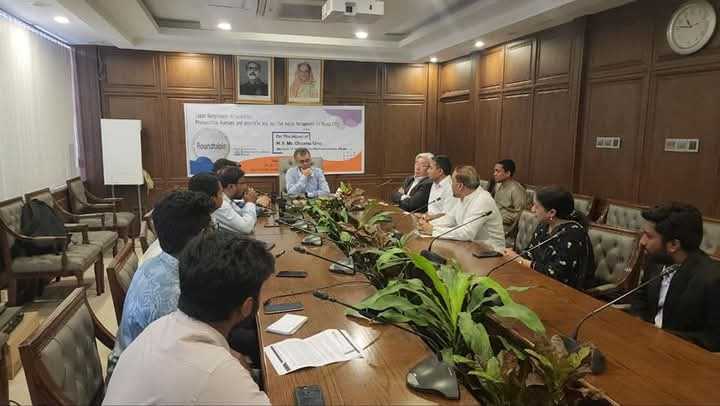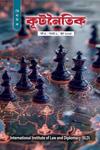
A roundtable discussion titled "Japan-Bangladesh Friendship: Prospective Avenues and Possible Solutions for Waste Management in Dhaka City" was held on Monday, May 22, 2023, at 9:30 AM in the conference room adjacent to the office of the Chief Executive Officer of Nagar Bhaban. The event was jointly organized by the Dhaka South City Corporation (DSCC) and the International Institute of Law and Diplomacy (IILD).
The discussion featured Osamu Ono, a member of Japan's House of Representatives, as a special guest. On behalf of DSCC Mayor Sheikh Fazle Noor Taposh, the inaugural speech was delivered by DSCC's Chief Executive Officer (Additional Secretary) Mr. Md. Mizanur Rahman. Other notable attendees included Dr. Md. Shafiullah, Executive Engineer of the Waste Management Department, and Md. Iftikhar Ahmad Chowdhury, Chief Waste Management Officer (Deputy Secretary).
Moderated by Dr. Ruhul Amin, Professor of the Department of International Relations at the University of Dhaka, the keynote speech was delivered by Shafiul Alam Shaheen, Executive Director of the IILD. Also present were Professor Dr. Md. Tawhidul Islam, Chair of the Department of Philosophy at Jagannath University, and researcher Dr. Abdullah Al Maruf, among others.
In his remarks, Osamu Ono stated, "We have learned about several challenges regarding waste management in Bangladesh’s cities, especially in Dhaka. In this context, we are particularly interested in improving waste management systems and implementing the 'Waste-to-Energy' (WtE) model. This process will utilize burning technology to separate waste, using certain components as raw materials for fuel. Solid waste can be incinerated to reduce its volume and generate heat, steam, and electricity."
He further added, "This waste management approach can significantly reduce urban pollution and contribute to socioeconomic development through the energy produced. If the city corporation shows interest, we are prepared to move forward."
Dr. Md. Shafiullah and Md. Iftikhar Ahmad Chowdhury from DSCC informed Osamu Ono about their existing waste management initiatives. They mentioned, "With JICA's (Japan International Cooperation Agency) support, DSCC is already implementing two long-term master plans. Key activities include public awareness and proper waste management."
They also highlighted that most waste in Bangladesh is biodegradable and is currently dumped in designated areas. "Using technology, this waste has great potential for producing organic fertilizers, which is vital for our agrarian economy and could have a positive environmental impact. Moreover, advanced technologies could also be used to generate electricity from waste."
The DSCC officials invited Osamu Ono’s organization to formally present their waste management models and proposals and expressed interest in adopting advanced technologies for the overall benefit of the city.
Professor Dr. Ruhul Amin commented, "If modern technology is applied to waste management in Dhaka, it will enhance urban living standards. Collaboration with Japan will strengthen the bilateral relationship while facilitating effective waste management, electricity generation, and funding."
Keynote speaker Shafiul Alam Shaheen emphasized, "Waste management and the feasibility of energy solutions have become significant global concerns. Historically, waste generation was minimal when population density was low and natural resources were sustainably utilized. However, industrialization and urbanization have significantly increased waste quantity and complexity, posing environmental and public health risks."
He added, "Effective waste management is critical to mitigating these risks, controlling water, soil, and food contamination, conserving resources, enhancing aesthetics, and promoting sustainable development."
Shaheen further elaborated on the "Waste-to-Energy" (WtE) or "Energy-from-Waste" (EfW) model as an alternative to waste dumping. "This process reduces solid waste by incinerating it to produce heat, steam, and electricity. Countries like China, Japan, and several European nations have set global examples with WtE technology. This approach can reduce solid waste volume by 80 to 95 percent, demonstrating its growing acceptance as a viable energy recovery method."
He concluded, "For Dhaka’s city corporations to advance holistically, effective waste management must be prioritized. Generating electricity from waste could significantly reduce the city’s energy deficit at a lower cost. Japan stands as a role model in waste-to-energy technology, and their collaboration with Bangladesh could usher in revolutionary changes.





Leave a reply